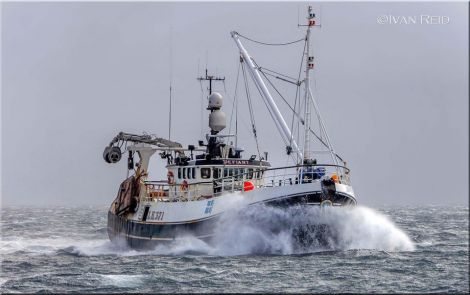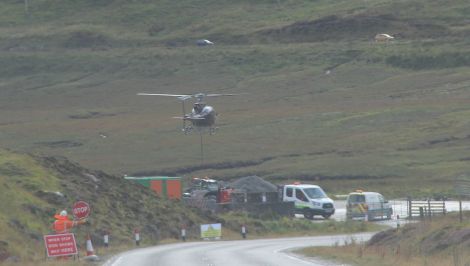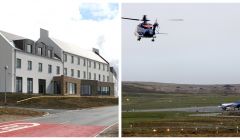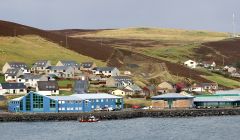Coronavirus / Council working on road to economic recovery for isles
Business sectors have mixed fortunes under Covid-19
SHETLAND Islands Council (SIC) is set to take on a lead role in the response to coronavirus as officials work on a “recovery and renewal framework” to help get the isles moving again post pandemic.
The slow journey towards a ‘new normal’ was triggered on Thursday when first minister Nicola Sturgeon outlined the Scottish Government’s steps to recovery.
SIC officials have meanwhile been working on their own plan, which will be put to councillors in the near future.
Uncertainty is facing virtually all business sectors in Shetland, but the risk is far from evenly spread, with tourism and hospitality taking a massive, potentially livelihood-threatening hit for many operators. Others, like oil, gas and the finfish industries are emerging relatively untouched.
Council leader Steven Coutts said that the council and its “partner agencies” were trying to get to grips with an economic future that would be very different.
Coutts said: “We will not go back to what we were doing before Covid-19. There will be changes in how we function as an economy and a community.”
The main focus for the council will be engaging with the UK and Scottish governments on getting the necessary investment to kick-start and grow the economy.
The islands deal will be at the forefront of that push. According to Coutts, the Scottish islands are among the few areas that do not yet have a growth deal of some sort in place. Shetland, he says, will pay dividends on investment.
He said: “It’s clear that if investment in infrastructure creates economic activity then the government gets the benefit of taxation. Shetland has always generated more economic activity per head of population than average and we are keen for that to continue.”
Become a member of Shetland News
Coutts added that successful lobbying of the governments had so far netted £7 million for Shetland business and community organisations. These efforts would continue with a strong focus on the tourist industry, where support so far had only been partly successful.
Shetland has been a “strategic” hub for hydrocarbons and is also ideally placed to take on that mantle in the transition to a low carbon economy, according to council officials.
Coronavirus, climate and Brexit
SIC development services director Neil Grant said: “Climate change is a massive influencer on what we do now. We are also coming out of Europe with trade agreements still to set up. There is a lot going on that influences how businesses behave.
“The council’s role is to make investments where appropriate and provide support schemes. This next year will be more important for the council than the last 10 in terms of how the council interacts with business in Shetland.”
Grant said that getting “economic stimulus projects” going in the isles was the most important thing for the economy.
According to Grant the proposed electricity interconnector and the Viking Energy wind farm would bring an estimated 600 construction jobs for up to five years and a possible 400 jobs in support industries.
The interconnector and wind farm go hand in hand, but the interconnector would also make possible another two major wind farms in Yell and one between Lerwick and Scalloway.
Another influx of workers needing accommodation would help shore the damage done to the tourism industry, said Grant.
Tourism, ironically, was one of the growth areas in the Shetland economy before coronavirus struck, with a year-on-year increase in visitors and a rapidly expanding cruise ship trade.
But Grant said that with a relaxation in travel both within Shetland and between Shetland and elsewhere in the not too distant future, the paramount concern was to work closely with the NHS to implement a test, trace and isolate support plan and adhere to practices that minimised the risk of continuing the pandemic.
Indications were, he said, that social distancing would continue in some shape or form for a year to 18 months, and the impact that would have on the workplace would need consideration so that the health rules are respected.
“Working remotely is massive for Shetland,” said Grant. His own experience during lockdown with using platforms like Microsoft Teams was that about 20 per cent of participants found the system unworkable because of poor internet connections.
Grant said that the experience of remote working enforced by coronavirus showed it was imperative the governments “got their shoulder behind” full connectivity for the isles.
Another challenge faces 200 school leavers this summer with potentially nowhere to go. Not all would fancy virtual studying for a university qualification. The council was working closely with Skills Development Scotland and is encouraging businesses to take on more modern apprenticeships.
It was also important to press on with the council/Hjaltland Housing Association house building programme as soon as possible, both to provide much needed social housing and an economic fillip.
Hauling the economy out of the mire
Chairman of the council’s economic development committee Alastair Cooper meanwhile said that with the oil price creeping back up ($36/barrel on Thursday) and maintenance work planned at Sullom Voe, oil prospects were once more on a slow ascent.
Cooper warned that with the furlough scheme only guaranteed until the end of July, the increase in universal credit applications locally could spike as more people “are shaken out” and become unemployed.
He said that if rules presently stopping construction are relaxed, things could get going again in Shetland with the Viking Energy wind farm likely to prove a boon to civil engineering and plant operators with diggers and lorries in high demand.
The council’s director of infrastructure services John Smith said he was confident that Shetland was better placed to weather the storm than many other areas.
The oil industry has been volatile in the past, he said, and the industry had been relatively unscathed by the pandemic, with work continuing.
But the pressure on efficiencies would be greater than ever, he added, with the potential for job losses every time there was an “adjustment” in the industry.
Technological advances would also be increasing automation in an expensive and dangerous production industry, and these would likely be accompanied by job losses.
The political jousting between Russia, the USA and Middle East was another factor. “It does not look very appealing from a macro point of view to lose key assets in North West Europe,” said Smith.
In the longer term, it was not the profitability of oil and gas, but the emerging low carbon economy that would see the industry replaced by renewables, he added.
Smith added: “We have to identify our strengths and keep trying to play to them. Maybe that will create an understanding of the benefits of remote and rural.”
Once these advantages are demonstrated, that could be an additional draw for people to move to the isles, he said.
Shetland Tourism Association chairperson Emma Miller said that many of the small businesses – sole traders – in the sector could face wipe out with their important summer season not happening and some aid being badly implemented.
She said: “The problem is we just do not know what the longer term impact will be. Most folk are resigned to not having a visitor season this year. My fear is they are not going to be able to survive.
“I am genuinely concerned for our entire tourist industry.”
Many larger concerns, like hotels, are already in dire straits. The award winning Scalloway Hotel is in administration while several others have been on sale for prolonged periods.
She said that while hoteliers she had spoken to had furloughed staff, she could not say that was the situation with all isles hotels.
Miller added: “Smaller businesses are not getting any financial support, especially where they are self-employed, and at the other end of the scale larger business do not have support because they are above the rateable value limit.
“We keep trying to push that point but we do not know how much more government funding will be coming.”
Miller said that many applicants had found themselves excluded from other support schemes on technicalities, like not owning business bank cards, and the excessively short window between scheme announcement and closure to application.
“As far as I can tell, the application process has been fairly flawed from the start,” she said.
Grant, meanwhile, said that the council continued to work with the governments to make better arrangements for the tourist sector. He said that the council might only step in if this route was “exhausted” as council initiatives should not “replace” what should come from government.
He said that the Scottish Government had been “nimble” in cooperating with much of what had been proposed so far.
Miller said that the STA had been working on providing advice for business owners and tourists alike.
She hoped that if Shetlanders take on the concept of the “staycation” then that would help the industry salvage some sort of a tourist season.
Seafood sector resilience
The isles’ most consistent industry, fishing, looks set to weather things better than most. Again, fortunes for parts of the sector are varied, with shellfish exports badly hit by the closure of continental eateries.
Whitefish landings, which make up the bulk of landings into Shetland, have been about two-thirds normal during lockdown, but are likely to increase again once circumstances change.
Shetland Fish Producers’ Organisation chief executive Brian Isbister said that the biggest factor that could boost fish catching would be the completion and opening of the new fish markets at Scalloway and Lerwick. The construction industry is presently paralysed by social distancing rules.
With the SIC-owned market at Scalloway virtually ready to go and the similar sized Lerwick Port Authority market in Lerwick near completion, the older, much smaller, markets at each port are the bottle-necks to landings.
Isbister said that while the fleet had the capacity to double its present weekly landings of 6,000 boxes, social distancing meant that this would not happen while the old markets were in operation.
Export logistics to the continent and the reduction in continental markets, while important, were of secondary importance, said Isbister.
“The amount of fish that we can sell will greatly improve once society gets moving again,” Isbister said, and anticipated a gradual improvement in domestic and export markets over the coming months.
“I am reasonably confident we will get back to the situation we were at. It is just a matter of time,” said Isbister.
Bigger problems could be facing the shore side industrial support base that fishing has, if boats facing less profitability are reluctant to spend on overhauls, re-engining or other work that has a spin-off to the support side.
Isbister said that it was important not to lose track of the Brexit talks, where little has been decided on the future of fisheries. He said that one improvement should be around the operation of foreign owned, British flagged vessels which have raised the ire of local fishermen in recent years because of their methods which effectively fence off large areas of seabed.
The salmon sector is calling on the UK and Scottish governments to support market access after a significant downturn in export sales through the first quarter.
HMRC figures published on 13 May show that volume and values of Scottish salmon exports in Q1 2020 fell by 40 per cent and 34 per cent respectively, compared to 2019.
In total, 13,600 tonnes of Scottish salmon were exported, worth £100 million. This was 8,900 tonnes less than Q1 last year with a loss in value of over £51 million in the period.
The closure of restaurants, cafes and takeaways, significantly reduced passenger flights and consequently higher freight charges and an emerging trend to buy local have all been factors in the export decline.
According to the Scottish Salmon Producers’ Organisation (SSPO) the sector is showing great resilience in its operations and farmers have worked hard to keep their key workers safe and livestock healthy.
But with the likelihood that quarter two export figures will also be lower than pre-Covid expectations, focus is shifting from the early operational challenges faced by farmers to the much-needed support required to re-enter, kick-start and develop export sales.
SSPO chief executive Julie Hesketh-Laird said: “The much-needed support being considered for the aviation sector must focus on freight as well as passengers. High quality Scottish salmon is available and we want to see significantly more flights leaving the UK with salmon in their hold.
“We operate in a highly competitive, global market and want to hold fast to our market share, which brings economic benefits to local and national economies.
She also called for a “swift and fair” conclusion to free-trade negotiations with the industry’s biggest trading partners in the EU and USA.
Scottish Shellfish Marketing Group’s (SSMG) chairman Michael Tait said that most of the company’s staff in Brae remained furloughed with only a few involved in keeping site ticking over.
He said: “Nothing much has changed. It is going to take some time to get back to normal. It is very difficult to form a view.
“There is no business now, but that does not mean that I do not anticipate business in the future.”
Become a member of Shetland News
Shetland News is asking its readers to consider paying for membership to get additional perks:
- Removal of third-party ads;
- Bookmark posts to read later;
- Exclusive curated weekly newsletter;
- Hide membership messages;
- Comments open for discussion.
If you appreciate what we do and feel strongly about impartial local journalism, then please become a member of Shetland News by either making a single payment, or setting up a monthly, quarterly or yearly subscription.























































































